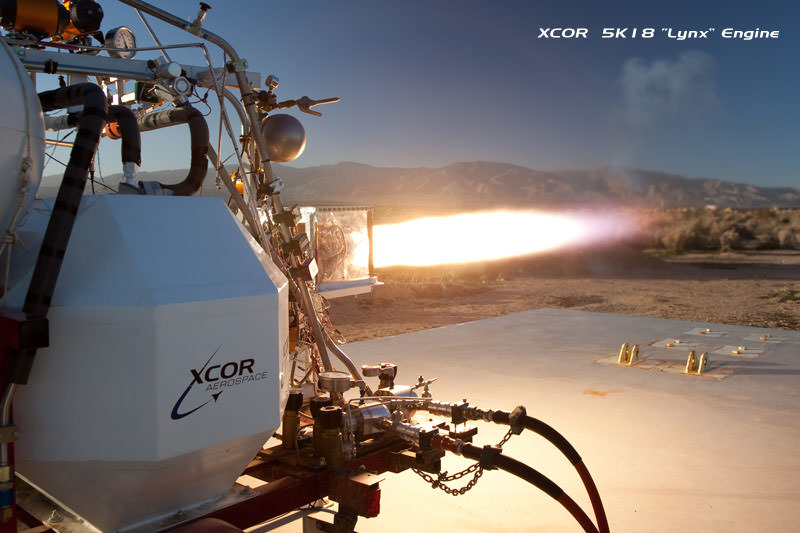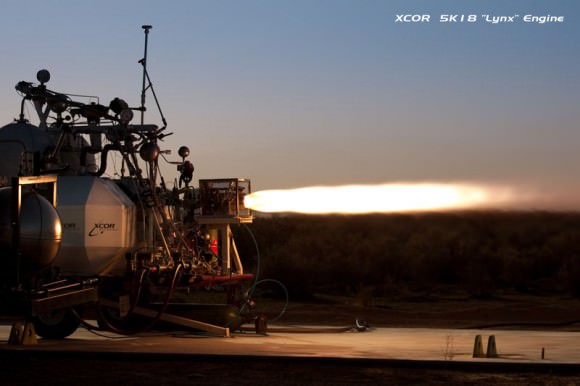[/caption]
In December, XCOR Aerospace, Inc. successfully completed its first test fire of the rocket engine that will be used to power its Lynx suborbital launch vehicle to the edge of space. Today, they released some new images of the test that are sure to excite any rocket enthusiast. The new engine, called the 5K18, produces between 2500-2900 lbs of thrust by burning a mixture of liquid oxygen and kerosene. The engine was fired Monday, December 15th, 2008 at XCOR’s rocket test facility located at the Mojave Air and Space Port. XCOR is the company that dropped its price of a suborbital ride to the edge of space to $95,000. The Lynx will use four of the 5K18 engines to carry people or payloads 61 kilometers (37 miles) above the Earth. “Firing a new rocket engine is always an important milestone,” said XCOR COO Andrew Nelson. “It gives everyone on the team a tremendous sense of accomplishment and demonstrates to customers and investors that XCOR knows how to take new ideas and make them a reality.”
The test of the engine was performed using pressure-fed propellants whereas the final version of the engine will be fed using XCOR’s proprietary cryogenic piston pump for liquid oxygen and a similar piston pump for kerosene.
XCOR has been around for nine years, and during that time has built and flown many different engines and conducted over 3,600 hot fires of rocket engines. The 5K18 is the eleventh engine design XCOR has built and fired. All have had perfect safety records, according to XCOR, and they also have not had any lost employee time due to injury during engine operations. It has also never seen one of its engines wear out, which says a lot of the durability of their hardware.
XCOR’s experience also includes building rocket-powered vehicles. The company has already developed and safely flown two generations of rocket-powered aircraft. Overall, the firm has flown these vehicles 66 times, and XCOR alone accounts for more than half of all manned rocket-powered flights in the 21st century. The Lynx will be the company’s third rocket-powered vehicle, and the first designed for space access.
If you’ve got a spare chunk of change and are interested in a suborbital flight with XCOR, RocketShip Tours, of Phoenix, AZ, has begun sales of tickets for suborbital flights on the Lynx.
Source: XCOR



TrustMe is looking for a soapbox. I don’t think this is the place to find what he’s looking for. 🙂
Looks like it’s going to be a hell of a ride!
I really enjoy your prolific news posts, Nancy. Thanks.
Firing these things off without a comprehensive before/after environmental impact study is foolish as well as dangerous. When Obama takes office, I pray he will have the wisdom to put these wasteful projects on the back burner indefinitely. We’ve destroyed this planet, let’s not destroy space too.
I may be mistaken, but as I understand it, the by product of many rocket engines is Steam and Water. Beside that, it isn’t President Elect Obama’s place to interfere with a Free Enterprise like this since it isn’t funded by the Government.
It is a bit egotistical to claim “We’ve Destroyed this Planet”. We couldn’t if we tried with every ounce of Human ingenuity we posses. We can make it uninhabitable for our own species. We may exterminate much of the life on the planet in the process, but I would be willing to guarantee that we Will not, and Can not destroy the planet.
It will go on, and millions of years from now, evidence of humanity will be an academic exercise for which ever creature replaces us as the next “intelligent” being to walk the face of the earth and assume our current spot on the food chain.
TrustMe (an oxymoron) is at it again. Very bad. You must submit to your own environmental impact study and measure the emptiness of your arguments, the ineffectiveness of your ideas and the sheer waste you’re excreting with every syllable. Far more damage is done to the planet with your foolishness than any test rocket. Every time you type, you’re hastening the downfall of modern civilization.
Thank you Mr. Greenjeans. Could not have said that better myself.
Aside from the unproductive and foolishly placed statement provided by some…
It is great to see so many private groups reaching this level of technology. Between SpaceShip One, Space X, XCOR, Virgin Galactic and many others; it is greatly inspirational to see that someone other than a major government is showing so much interest in the exploration of space. Who knows, in years to come we may start to see private companies shoot not only for orbit, but also for the moon, Mars, the belts, Jupiter, Saturn… maybe i shouldn’t get too far ahead of myself. But even so this truly makes me happy.
TrustMe…
No. Trust me! Your post just polluted the earth, ever thought about that? All the switches/servers used up alot of energy routing your message and for what purpose? Make that your enviromental study.
Seriously, wrong place to preach about enviromental hazards, since most of us are educated enough to realize that space might be the thing to save us all, one way or the other. Or is it just me?
This guy has caused quite a stir. I’m surprised anyone takes him seriously.
If you honestly claim to be concerned about the future of mankind, the planet, and climate change, then I don’t see how you can argue against space exploration. Its either in or out.
Hey Trustme,
There was a news story yesterday about how 2 google searches uses the equivilent energy of boiling 2 pots of water! You’d better stop using the internet because you destroy the planet when you do.
Signed
TakeAFlyingLeap
I thought it was already well established; DONT FEED THE TROLLS!
Ohhhh nooooo, Trustme just destroyed the world by using Internet!!!!!
We only have the one environment here on Earth, and if we damage it, it is very difficult, time-consuming, and expensive to repair. While TrustMe jumped to a negative conclusion, his implied question – does rocket engine static testing have an unacceptable impact on the environment – is valid.
XCOR rocket engine static tests fall under the jurisdiction of the Kern County Air Pollution Control District (KCAPCD). XCOR holds a current and valid KCAPCD Permit To Operate (PTO) for the test stand shown. The PTO lists several pollutant thresholds XCOR may not exceed in a given permit year.
These threshold limits are not difficult to meet when testing liquid fuel rocket engines. Indeed, when KCAPCD published a new Rule 431 in 2006, setting new lower limits for particle emissions, LOX/methane and LOX/kerosene were specifically exempted from most of the new reporting requirements, because they produce so little smoke.